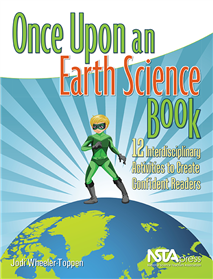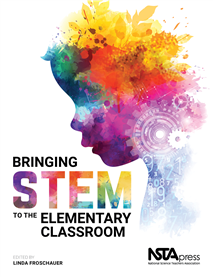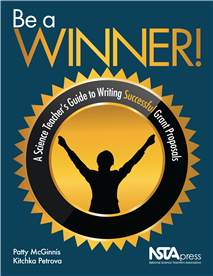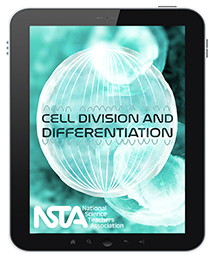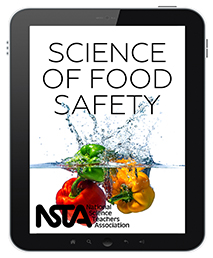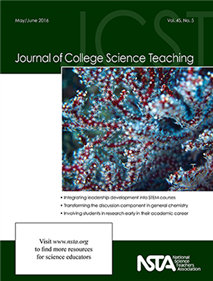All Resources
Book Chapter
It’s hard to conceive of the sheer size and the vast amount of empty space in our solar system, much less a galaxy or the universe. It is much easier for the planets to be reduced to a list of their properties. In this chapter, we’ll fight that t...
Book Chapter
Sometimes students find the causes of seasons to be a difficult concept. They often need to work with visual representations to understand the implications of axial tilt. One misconception is that seasons change as the Earth moves farther from and cl...
Book Chapter
In this chapter, students are asked to consider public policy decisions as they relate to energy usage. For this activity, students will serve as consumer advocates to evaluate and rate hair dryers. In the process, they will observe that hair dryers ...
Book Chapter
Many resources help you encourage young children to learn about science, technology, engineering, and math (STEM). But only this book of quality STEM experiences was curated by the veteran educator who edits Science and Children, NSTA’s award-winni...
Book Chapter
Getting Started: May the FORCE Be With You!
Available in May 2016!Be a Winner! is your chance to learn from veteran science teachers about the secrets to successful grant writing. Formatted as a handy workbook, this practical book takes you step by step through the writing process. You’ll le...
Book Chapter
If you work with students who struggle to understand their Earth science texts, this book provides everything you need to boost their skills in both science and reading. Once Upon an Earth Science Book starts with advice on teaching reading comprehen...
Interactive E-book
Cell Division and Differentation
Cells carry on the many functions needed to sustain life, including cell growth and development. The genetic information encoded in DNA molecules provides instructions for assembling protein molecules, which are both necessary for producing more cell...
Interactive E-book
Bacteria live in close association with humans. Bacteria are masters at exploiting a variety of niches in the human body. Most of these bacteria are harmless to the human body and many are important in assisting its normal, healthy functioning. Disea...
Journal Article
Jump Starting Research: Preresearch STEM Programs
Three different course models devoted to preparing science and engineering students for successful research endeavors were offered at three research institutions. Goals of this work include (a) involving students early in their academic career so the...
Journal Article
A Visual Approach to Helping Instructors Integrate, Document, and Refine Active Learning
This article describes a visual approach to integrating observational data into self-evaluation and peer review of teaching, practices that can lead to adoption of evidence-based active-learning strategies in STEM. This approach was designed to be im...
Journal Article
Engaging students, checking for understanding, and encouraging oral participation are ongoing pedagogical challenges in large lecture courses. In this study, the instructor used notecard-facilitated cold-calling as a means of encouraging attendance a...
Journal Article
To develop a context for program-level design decisions pertaining to anthropogenic climate change, the authors studied the prevalence of courses focused on human-induced climate change in undergraduate marine science and environmental science degre...
Journal Article
A Geometric Model to Teach Nature of Science, Science Practices, and Metacognition
Using the science practice model in science classes for preservice teachers addresses three important aspects of science teacher preparation: teaching the nonlinear nature of scientific process, using scientific practices rather than the ambiguous te...
Journal Article
Integrating Leadership Development Throughout the Undergraduate Science Curriculum
This article discusses the STEM (science, technology, engineering, and mathematics) Teaching and Research (STAR) Leadership Program, developed at Austin College, which engages students in activities integrated into undergraduate STEM courses that pro...
Journal Article
Research and Teaching: Instructor Use of Group Active Learning in an Introductory Biology Sequence
Active learning (or learner-centered) pedagogies have been shown to enhance student learning in introductory biology courses. Student collaboration has also been shown to enhance student learning and may be a critical part of effective active learni...
Journal Article
Undergraduate engineering education in the United States is in need of reform that addresses the recruitment and retention of a diverse population of students. Change Chem is a curriculum reform model that has been created to address this issue for f...
Journal Article
Point of View: The USS Dallas: Where Science and Technology Count
This column shares reflections or thoughtful opinions on issues of broad interest to the community. This month’s issue describes a tour of a fast attack submarine based in New London, Connecticut, to get a better understanding of its working enviro...
Journal Article
Case Study: Science, Pseudoscience, and Nonsense
This column provides original articles on innovations in case study teaching, assessment of the method, as well as case studies with teaching notes. This month’s issue discusses scientific illiteracy and a course designed to combat this problem....
NSTA Press Book
Science Learning in the Early Years: Activities for PreK-2
REVERE Award Winner, PreK-12 Learning Group, Association of American Publishers!...
By Peggy Ashbrook
NSTA Press Book
The Feedback Loop: Using Formative Assessment Data for Science Teaching and Learning
What really helps your students learn science: Labs? Group work? Certain types of problems or test questions? Something you never even thought about? Find out with data that go way beyond what standardized test scores tell you. The Feedback Loop desc...
By Erin Marie Furtak, Howard M. Glasser, Zora M. Wolfe
NSTA Press Book
Uncovering Student Ideas in Earth and Environmental Science: 32 New Formative Assessment Probes
If you’re new to formative assessment probes, you’ll love this timely addition to the bestselling Uncovering Student Ideas in Science series. Authors Page Keeley and Laura Tucker give you 32 engaging questions, or probes, that can reveal what you...
By Page Keeley, Laura Tucker
NSTA Press Book
Creative Writing in Science: Activities That Inspire
Do you ever feel like your science classes could use a shot of imagination? Boost the creativity quotient by assigning a travel blog about the digestive system, a packing list for the planets, or an interview with an atom. You’ll inspire students t...
By Katie Coppens



